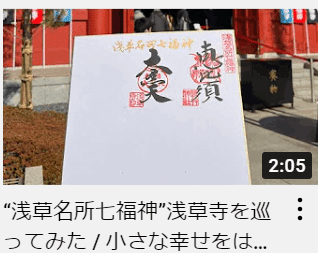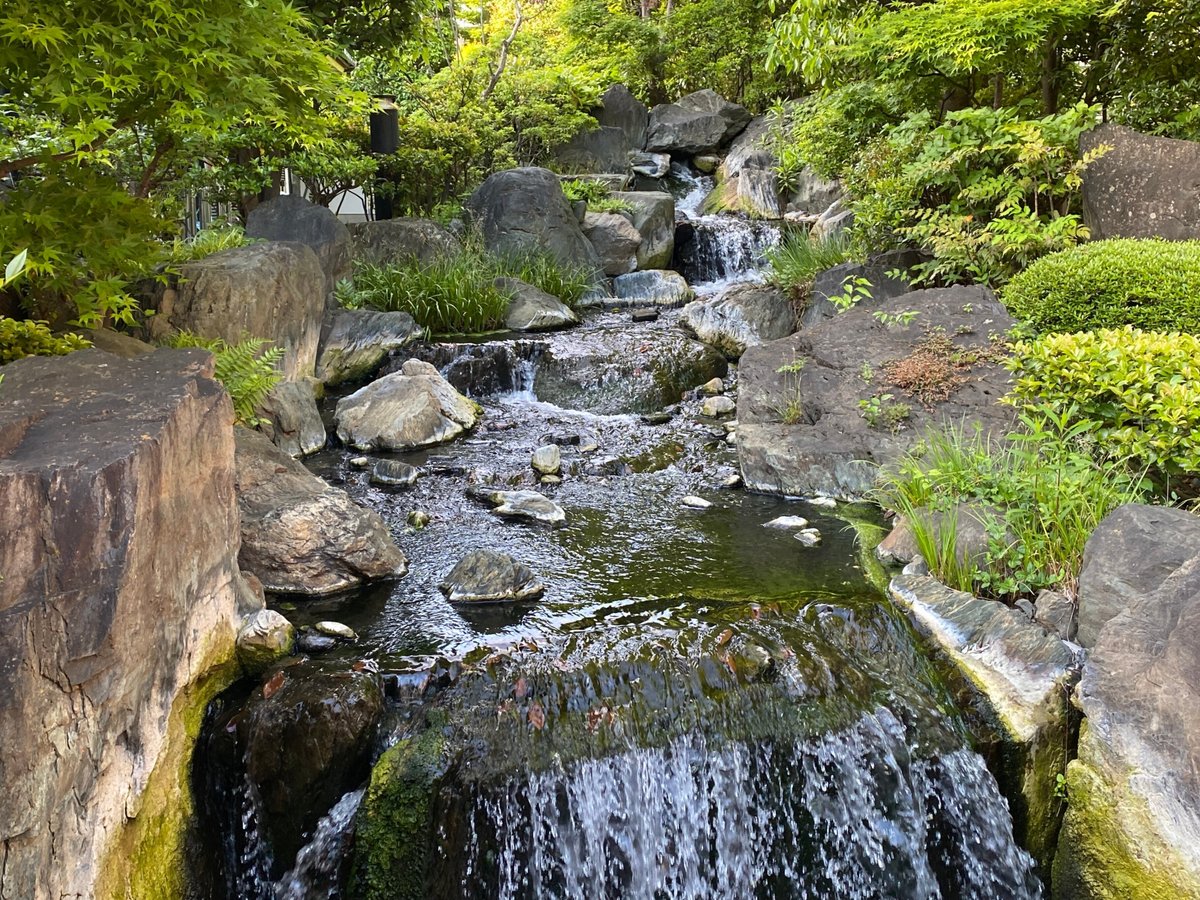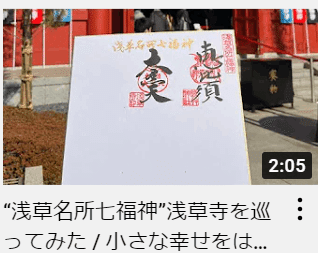
浅草名所七福神巡り-Ⅱ【大黒天】/ Seven Gods of Good Luck Tour in Asakusa-II [Daikokuten]



Click here for the program video
再スタート!大黒天さまの御朱印を目指します / Restart! Aiming for the red seal of Daikokuten!
<この日のコース>
雷門 → 浅草神社 → 浅草寺 → 矢先稲荷神社 → 鷲神社 → 吉原神社 → 橋場不動院 → 石浜神社 → 今戸神社 → 待乳山聖天 →浅草駅
<Course of the day>
Kaminarimon → Asakusa Shrine → Asakusa Temple → Yato Inari Shrine → Washi Shrine → Yoshihara Shrine → Hashiba Fudoin → Ishihama Shrine → Imado Shrine → Machidaiyama Seiten → Asakusa Station


浅草神社で恵比寿天の御朱印を色紙に記していただきました。
神社を出たら、もう一度浅草寺の前を通り、御朱印(影向堂内)と書いてある看板の矢印を目安に、境内を歩きます。徒歩にして2分といったところ。
堅牢な石造りの橋がみえました。
I received a red seal for Ebisuten at the Asakusa Shrine on a colored paper. After leaving the shrine, pass by Sensoji Temple once again and walk through the temple grounds, following the arrow on the sign that says "Goshuin (in the shadow hall)" as a guide. It was about a two-minute walk.
I saw a solid stone bridge.
現存する都内最古の石橋 / The oldest existing stone bridge in Tokyo



本堂の北西にある看板の示す通り、橋を渡ります。
小滝から注ぐ池の中、鮮やかな衣装をまとう錦鯉たちが悠々と泳いでいます。
案内板によると、現存する都内最古の石橋と書いてある。
元和四年(1618年)浅草寺に東照宮が造営された際に、参詣のために造られたとか。
徳川家康の娘、振姫の婿、紀伊国和歌山藩主浅野長晟が寄進と書かれています。由緒あるお寺の風格が感じられますね。
先へ進みましょう^^
Cross the bridge as indicated by the sign to the northwest of the main hall. Nishikigoi carp in vivid costumes are swimming leisurely in a pond flowing from a small waterfall. According to the information board, it is the oldest existing stone bridge in Tokyo. It was built in 1618 when Toshogu Shrine was built at Sensoji Temple for visitors to pay their respects. It is written that Asano Nagasheng, the son-in-law of Tokugawa Ieyasu's daughter, Princess Furihime, and a feudal lord of Wakayama in Kii Province, donated the money. You can feel the dignity of a temple with a long history. Let's go ahead ^^.
観音さまを守護する十二支の守り本尊のお堂”影向堂” / Yogodo, the hall of the twelve guardian deities of the Chinese zodiac, protects the Kannon.



青い空に朱が映える寄棟造りの堂宇は美しい。
こちらのお堂で、ご本尊の聖観世音菩薩と大黒天のご朱印を授けていただけます。
大黒天は元々インドや中国で寺院の守護や五穀豊穣を司っていました。
日本ではお馴染み、大きな袋を背負って俵に乗った福々しいお姿が有名。
七福神の色紙に、二番目の神様がはいりました。
The hall is beautifully built with a hipped roof, the vermilion color shining against the blue sky. In this hall, you can receive red seals for the main deity, Sho-Kannon Bosatsu (Bodhisattva of Sacred Avalokitesvara), and Daikokuten. Daikokuten originally served in India and China as a guardian of temples and for good harvests. Familiar in Japan, he is famous for his blessed figure riding on a bale with a large sack on his back. The second deity has been added to the Seven Gods of Good Fortune color paper.
貴重な銅像”観音菩薩”や都の重要文化財”六角堂”が点在 / Dotted with precious bronze statues of "Kannon Bosatsu" and "Rokkakudo," an important cultural asset of the capital.



影向堂の周辺には、貴重な銅像や建築物があります。
聖観世音菩薩もそのひとつです。
案内板によると、像高は99.5センチメートル、享保五年(1720年)に尾張国出身の廻国聖、孝山義道が発願し、神田の鋳物師、小沼播磨守藤原長政が制作したとありました。
元禄六年(1693)造立は、青銅製の阿弥陀如来像。
無量光如来とも呼ばれ、西方極楽浄土に住まい、慈悲の光で世界をあまねく照らし、我々をお救いくださるありがたき仏様です。
その傍ら、浅草寺の守護神として、金龍、九頭龍権現が祀られている。
There are valuable bronze statues and architectural structures in the vicinity of Kagemukodo. The statue of Saint Kannon is one of them. According to the information board, the statue is 99.5 cm in height and was created in 1720 by Kozan Yoshimichi, a saint who was from Owari Province, and Nagamasa Fujiwara, a Kanda foundryman.
The bronze statue of Amida Nyorai, also called Muryoko-nyorai, was built in 1693. Also called Muryoko-nyorai, the Buddha resides in the Paradise of the West, illuminating the world with the light of his mercy and saving us all. Beside him, a golden dragon, Kutouryu Gongen, is enshrined as the guardian deity of Sensoji Temple.

室町時代(16世紀頃)の建立で東京都の指定文化財です。ご本尊は日限(ひぎり)地蔵尊で、日数を決めて祈るとその願いが叶うとされているそうな。詳しくは浅草寺のHPへ。

次回は、境内を出て、矢先稲荷神社へ。
乞うご期待。
In the next installment, we will leave the precincts of the shrine and go to the Yasaki Inari Shrine. Stay tuned.
Photographing・Writing / 虎(hhu)

Click here for the program video
余白。九代目市川団十郎のこと / Margins. Danjuro Ichikawa IX.

浅草寺の裏手に大きめの広場があります。
前述した記事に書きましたが、三社祭の際はここに浅草神社の氏子町会の御神輿約100基が集います。
よもやこんな場所に九代目”市川団十郎”がいるとは、意外と知らない御仁が多いかも。
There is a large plaza behind Sensoji Temple. As mentioned in the aforementioned article, about 100 portable shrines of the Asakusa Shrine Ujiko-machikai gather here during the Sanja Festival. Many people may be surprised to know that Danjuro Ichikawa IX is located in such a place.

十八代目中村勘三郎が2008年に開催した奥山の”平成中村座”も、元は浅草の地が歌舞伎の町であったことの証明と言えましょう。
お金を小判に両替して、飲み食いができた奥山風景は、まるで時代劇の世界のようで楽しかったなぁ。
虎はまだその小判を大切に持っています^^/
あの日の出来事が昨日のことのように懐かしく思い出されました。
合掌。
The "Heisei Nakamura-za" in Okuyama, which was held by Kanzaburo Nakamura, is also proof that Asakusa was originally a Kabuki town.
The scenery of Okuyama, where people could exchange money into koban and eat and drink. The tiger still has the koban in his possession, reminding me of the events of 2008 as if it were only yesterday.
Join hands.
